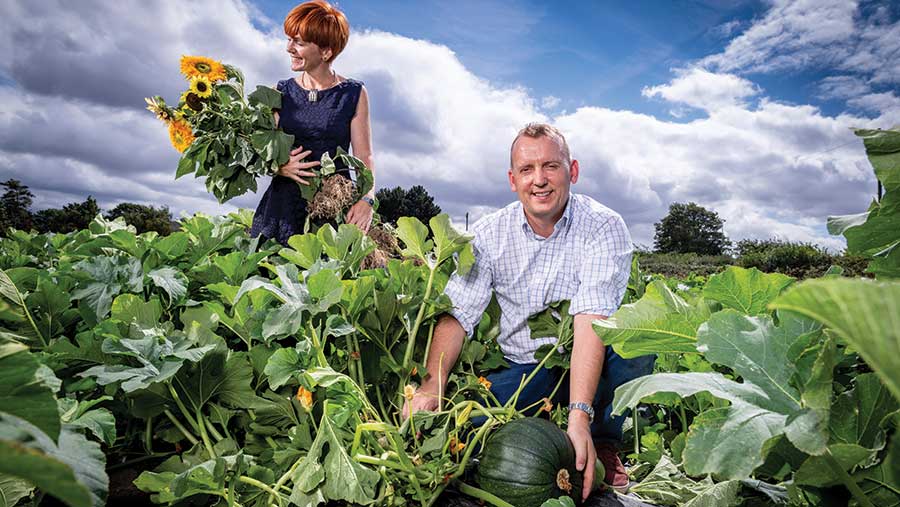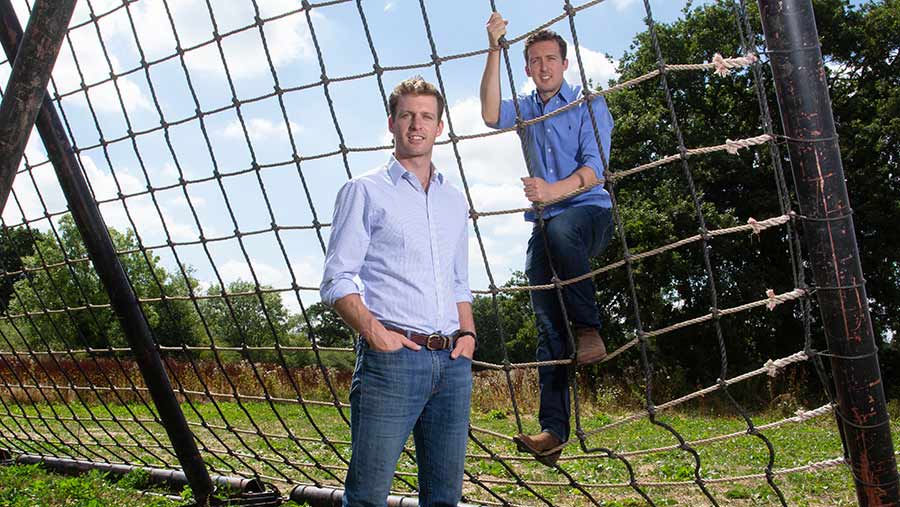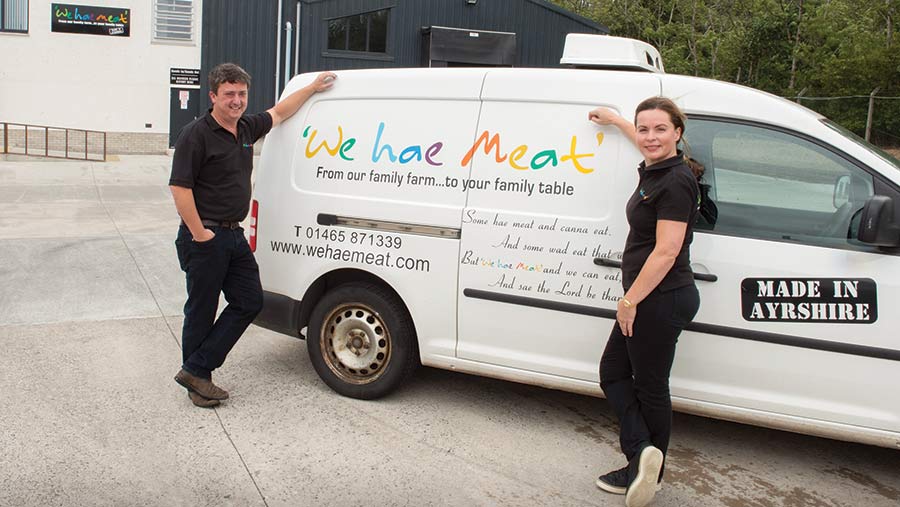Farmers Weekly Awards: Diversification Farmer of the Year finalists 2018
Dedication, ingenuity and strong leadership are common traits among this year’s finalists, who have each identified a marketplace and created successful diversified businesses in just a small number of years.
See also: Meet the 2018 Farmers Weekly Awards finalists
The 2018 Diversification Farmer of the Year finalists
- Farmer Copleys, Robert and Heather Copley, Ravensknowle Farm, Pontefract, West Yorkshire
- Charlie and Will Moreton, Welsh Road Farm, Offchurch, Leamington Spa, Warwickshire
- We Hae Meat, Alex and Carlyn Paton, Cairnhill Farm, Girvan, Ayrshire
The judges
- Philip Case, Farmers Weekly news editor
- Jonny Crickmore, 2017 Farmers Weekly Awards Diversification Farmer of the Year
- Michael Mack, independent judge, farm and business management consultant, Savills
Robert and Heather Copley
Farmer Copleys, Ravensknowle Farm, Pontefract, West Yorkshire

Robert and Heather Copley © Jim Varney
Farmer Copleys have carved out a smashing diversification niche with their autumn pumpkin festival.
Robert Copley, director of Farmer Copleys, got the idea while visiting farms in America and the annual event has grown in popularity every Halloween.
The UK’s biggest pumpkin festival takes place during October weekends and attracts up to 8,000 visitors a day, with families travelling from as far as Liverpool and Newcastle to take part.
This year, 135,000 pumpkins have been planted from more than a dozen varieties, both ‘warty’ and smooth in a range of colours including mixed, red, green, black, blue, yellow and, of course, orange.
Visitors will be invited to pick their own pumpkins from the field, which are placed in wheelbarrows and priced according to size.
After the festival, pigs are introduced to eat up around 10,000 leftover pumpkins. The free range pumpkin-fed pork and sausages are then sold in the farm shop ahead of Christmas.
Farm facts
- 39ha working farm producing lamb, beef, grass, rhubarb, asparagus, raspberries, blackberries, liquorice, honey, pumpkins, gourds and maize
- Flock of 200 sheep and 50 outdoor pigs
- Seasonal events including pumpkin, liquorice and farm festivals
- Impressive farm shop, café and restaurant by night
- Highly motivated team including 80 local people
Customer awareness
Robert’s wife Heather says the pumpkin festival highlights the farm’s ethos of “know what you’re eating and where it comes from”.
“We have taken the concept of pumpkin festivals, but totally anglicised ours. It’s not about Halloween here; it’s all about the pumpkins,” she explains.
Heather and Robert are proactive with the public and are both very visible in the business to customers. They are passionate about telling people the story behind farming.
As well as the pumpkin festival, many other large events are held on the farm, with family at the core of everything.
The Pontefract site hosts one of the largest corn maize maze events every day during the summer holidays. This includes interactive game sheets and ‘maize-of-vision’ glasses, slides, tractor rides, pedal carts, a bale climb and a jump pillow.
There is also a circus in May and pick-your-own strawberries from June to August. The farm produces its own liquorice and to celebrate the town’s connection to this root crop, it holds a liquorice festival in July when visitors can taste liquorice flavour ice-cream, pork and sausages.
This year, more than 1,500 people visited the farm for Open Farm Sunday to learn about farming. Local farmers were invited to set up stations and educate the public about their sectors. Heather, a trained agronomist, talked about the importance of good soils.
Innovation and leadership
Farmer Copleys’ journey into diversification began in 2003 with a small farm shop and butchery room. The business has since undergone four phases of development, including a £1.2m investment in a café-restaurant, upstairs events space and farm shop upgrade, which opened last year.
Team numbers have swelled to 80 and the company has had to buy in skills, which has resulted in rising labour costs. Heather and Robert have employed a people manager to help improve the culture of the business and identify workers with relevant skills.
When Farmers Weekly judges visited the farm in July, we witnessed the opening day of the gelato ice-cream counter in the farm shop. The 20 flavours of fresh ice-cream are a hybrid of local raw ingredients and Italian flavourings.
Staff are happy and motivated and they are proud to wear their uniforms and don Yorkshire caps. They are kept updated through quarterly newsletters, involved in decision-making and rewarded for good performance with free tickets or weekends away.
Beyond the business, Robert is vice-chairman of the Yorkshire Agricultural Society and the Copleys are involved in the Great Yorkshire Show, schools, colleges, agricultural colleges and conferences to get the message across about agriculture, business and food.
Future ambitions
Robert and Heather have created a graphic on the farm shop to show the story behind Farmer Copleys, and they are planning further growth and investment in the business in the coming years.
They have created a new growth orbit tool, which runs to 2025. The business plan includes outlines for further funding and development of the farm shop and restaurant, new avenues of diversification, such as evening events, celebrations, targets for quieter days and further engagement on social media through videos and billboards.
This message will be communicated to the whole team and form the backbone of the next seven years of investment.
The judges liked
- Connect farming message in everything they do
- Use practical methods and social media to educate public about farming
- On-farm events attract huge interest and serious footfall
- Great merchandising in farm shop, especially butcher’s counter
- Clear plan to develop business in future
What the judges said
“Robert and Heather have built a fabulous farm shop, café-restaurant and function room, and used knowledge acquired from overseas trips to host exciting seasonal events.”
Charlie and Will Moreton
Welsh Road Farm, Offchurch, Leamington Spa, Warwickshire

Charlie and Will Moreton © Tim Scrivener
When Charlie and Will Moreton decided to replace their potato fields with large obstacles and host wild running events for the public, their farming neighbours thought they were crazy.
In 2010, the Moretons found themselves at a crossroads. Wheat prices were low and they could either expand the farm’s 485ha arable operation, or diversify into sports tourism. The sports-mad brothers opted for the latter and contracted out the arable work.
Charlie, now 34, suffered a neck injury playing rugby aged 25, so he gave up the sport and developed a passion for running. He realised the UK was experiencing a boom in mass participation running events and set about creating his own.
The concept of the Wolf Run – an acronym for “woods, obstacles, lakes and fields” – was born. It involves a 10km run across rough terrain featuring 25 man-made and natural obstacles, including lakes, fallen trees, bale stacks and a 100m waterslide.
Farm facts
- Contract farming arrangement for arable work
- HS2 project to cut across farm, new site needed
- Higher Level Countryside Stewardship scheme
Customer awareness
The inaugural Wolf Run, held on the farm in September 2011, attracted 650 runners and was organised by friends and family.
Last year, more than 35,000 people of all abilities, aged from 18 to 82, took part in four Wolf Runs. The most popular run attracted 9,200 runners and 5,000 spectators. An ‘Alpha Wolf’ medal is awarded to people who complete all four runs.
A festival atmosphere is created on race days, with live bands and DJs, local food stores, a bar and entertainment for families. Partners and sponsors include Clif Bars and Skinny Brands lager.
“The Wolf Run has three aims: have a good social with friends or work colleagues, achieve your health and fitness goals, and maybe earn a bit of money for charity at the same time,” says Will, 32.
“The beauty is we can set our own prices, rather than be open to the fluctuation of the wheat price. Everybody enters online before they run. There’s no chasing debts.”
Early bird entries cost £45/head and near the start date it costs £65/head. Finishers receive a goodie bag that includes a ‘technical’ branded t-shirt. These are freshly designed by Charlie each year and are manufactured in China.
The ratio of men to women participants is 50:50 and repeat runners make up 55% of entrants. Runs are not timed and the emphasis is on camaraderie rather than competition.
Innovation and leadership
The diversification is very much a family business – Charlie’s wife, his parents and sister are all involved. Eight full-time and 10 part-time staff are employed.
Charlie and Will also design their own obstacles, which their father and uncles build in the farm workshop with help from team members, including ex-Army personnel. Obstacles are checked and signed off by a structural engineer.
Tractors, telehandlers and diggers are used to lay out the course, including tracks and water obstacles.
Insurance is inevitably a big cost, but the Moretons take health and safety seriously. Race days are operated by a 40-strong team, including eight doctors, supported by the Red Cross and 120 marshals at key locations.
Runners have raised hundreds of thousands of pounds for more than 1,500 charities. The brothers have also raised and donated tens of thousands of pounds to UK charities.
Future ambitions
But the brothers now face a new challenge – the government’s HS2 project will bisect their farm, meaning the September 2018 run will be the last they will host at the original venue. Charlie and Will say this is absolutely gutting, but they are determined that this won’t throw them off course.
This year, they have been transporting their obstacles to host runs at two other farms – Stanford Hall Estate in Leicestershire and Pippingford Park in East Sussex. They have ambitious plans to expand and are seeking an alternative farm venue in Warwickshire.
In 2019, they will host a health and fitness festival in tandem with one of the runs. They are also exploring plans for sprint events at town centres or beaches.
“We had a great idea, did our research, were ahead of the curve and, through careful but continual expansion, are now well placed to capitalise on the rising demand for rural-located leisure activities,” says Charlie.
The judges liked
- Identified market opportunity and grasped it
- Clear understanding of revenue numbers
- Public engagement with the countryside
- Large sums of money raised for charitable causes
- Good planning and attention to detail
What the judges said
“Charlie and Will thought out of the box to create a unique farm diversification, which brings people together in the countryside, improves their health and raises invaluable funds for good causes.”
Alex and Carlyn Paton
We hae meat, Cairnhill Farm, Girvan, Ayrshire

Alex and Carlyn Paton © Angus Findlay
Alex and Carlyn Paton achieved a long-held ambition to create a brand for meat produced from the family farm by launching their butchery business We hae meat.
In 2007, the couple took the bold decision to diversify with the purchase of the town’s butcher shop in Girvan, just down the road from Cairnhill Farm, and they have never looked back.
By 2009, demand for We hae meat products had grown so much that the business had outgrown the shop premises and the Patons decided to move to a factory unit, which they built on the outskirts of their farmland.
Shortly after the move, We hae meat won a contract to supply sausages and pie products to local Asda stores.
Their business has since expanded considerably and its products are currently stocked in most supermarkets across Scotland, including Aldi, Asda, Co-op, Lidl, Morrisons and Tesco.
Farm facts
- 231ha family partnership
- Cattle bought from carefully selected local breeders and finished on farm
- Butchery division launched in 2007
- Meat sold to retail, catering industry and food service
- 60 local people employed in full-time positions
Customer awareness
The key to the Patons’ success is knowing their marketplace and supplying quality butchery products with full traceability, sold at a commercially viable price.
Their slogan “From our family farm… to your family table” conveys the family business ethos and sourcing policy to customers.
“Our message is the same now as it was when we first started: ‘It’s a butcher shop quality product, but we’re offering it to consumers in the convenience of supermarkets’,” says Carlyn.
They have also created a second brand, Cairnhill Farms, to supply premium quality assured meat from the family farm to hotels and restaurants.
Alex Paton & Son do not rear cattle, but buy in ready to finish cattle aged 12 months and above from carefully selected breeders in the local area.
They choose the top 5% of breeders that they know will supply healthy, top quality cattle with the right body confirmation and carcass specification that fits the feeding and handling regime of their cattle finishing technique.
The finishing process takes a minimum of 100 days and all cattle are sent to the local abattoir for slaughter. Outdoor grazing is a top priority for the cattle when the weather permits.
Innovation and leadership
From a modest beginning opening a small butcher’s shop employing three people, the Patons have built a successful business that employs over 60 local people in full-time roles. The We hae meat brand has also entered Kantar’s Top 50 Scottish Food and Drinks brands.
Packaging improvements have helped to gain a new product listing in Asda and increase sales within Co-op stores. A new Aberdeen Angus sausage product will allow the farm to grow its herd size of this breed in the coming years.
Alex and Carlyn work closely with a small management team to achieve their objectives. Staff display a professional attitude towards their work, are well trained and speak highly of their bosses.
The Patons have a five-year carbon management plan which they are working towards and they believe they are the most environmentally-friendly meat processor in the UK.
Last year, they expanded their operating premises and tripled the size of their manufacturing site’s production and storage facilities. This included a £750,000 investment in renewable energy through a biomass combined heat and power (CHP) system.
The CHP system has enabled them to reduce their carbon footprint by 89% and save £100,000 annually on electricity.
Future ambitions
Over the next five years, We hae meat plans to grow the business by securing further product listings with its suppliers, maximise the sales of existing lines and bring in new customers.
The company will continue to operate a regular product sampling schedule and take new product development pitches to buyers when trying to secure new listings. In-store sampling will also be used to grow the sales of existing lines.
Alex and Carlyn will also explore plans for a new range of products aimed specifically at children. Other options include extending sales south of the border, and export sales of frozen meat ranges to other countries.
The judges liked
- Driven leaders inspire productive team
- Simple but very effective business idea
- Impressive business model with phenomenal growth
- Clear understanding of their marketplace
- Created different branding for supermarkets and restaurants
What the judges said
“Alex and Carlyn have worked hard to establish a very impressive family butchery business that has required a strong attention to detail and a clear understanding of their customers.”
